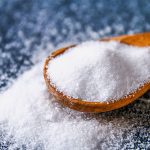 Usually refers to sodium chloride, common salt or table salt (chemically any product of reaction between an acid and an alkali is a salt). The main sources are either from mines in areas where there are rich deposits of crystalline salt, or deposits left by the evaporation of sea water in shallow pans (known as sea salt).
Usually refers to sodium chloride, common salt or table salt (chemically any product of reaction between an acid and an alkali is a salt). The main sources are either from mines in areas where there are rich deposits of crystalline salt, or deposits left by the evaporation of sea water in shallow pans (known as sea salt).
A white crystalline substance that consists of Sodium (39%) and Chlorine (61%) and is used to season foods.
Humans need salt to live and, more important, they need it to cook. For this reason, there are numerous words in English that derive from an Indo-European source that meant salt. For example, this Indo-European source evolved into the Old English sealt, first recorded about a thousand years ago, which eventually developed into the modern salt. The same Indo-European source also gave rise to the ancient Romans’ word for salt, the Latin sal. From sal the Vulgar Latin form salata developed, meaning salted, and then became part of the name herba salata, meaning salted vegetables. The abbreviated form, salata, gave rise to the French word salade, which was adopted into English at the end of the fifteenth century as salad. The Latin word sal also gave rise to salsa, a Medieval Latin word that meant salty seasoning. This salsa became the French word sauce—so named because sauces usually contain much salt—which English borrowed in the middle of the fourteenth century. At about the same time, English also took from French the word saussier, denoting a dish for sauce, which eventually became the word saucer. The Latin sal followed yet another line of development when it gave rise to the French saudsse, applied to meat preserved with salt, which became the English word sausage in the middle of the sixteenth century. Most recently, in 1935, English took from Spanish the word salsa, the name of a spicy tomato sauce that Spanish had much earlier derived from Latin. All these salt words are related, incidentally, to two other non-culinary words: silt and salary. The fine soil known since the early sixteenth century as silt originally referred to the salty deposits found near beaches; a salary, on the other hand, was originally a stipend paid to sweaty Roman soldiers so that they could buy salt for themselves. Perhaps even more surprising, though, is that none of these words are related to the words salient or salacious; those words may sound like saline—another salt word—but they were actually formed from salire, a Latin word meaning to leap that is also the basis of summersault.
Small white crystals mainly of sodium chloride used to flavour and preserve food.
A crystalline compound, usually containing a metal, formed when an acid is neutralised by an alkali.
An inorganic compound having a negative and a positive ion that dissociate in solution. Table salt is sodium chloride.
Compound formed by the reaction of an acid and a base, especially sodium chloride, table salt.
Any compound formed by a base and an acid; sodium chloride (common salt). Common salt, or table salt, is only one of many salts.
Any substance produced by the replacement of the acidic hydrogen of an acid by a metal or basic radical. It is most commonly used to describe sodium chloride, a vital constituent of cells. The proper balance of salts in the cells and body tissues is important for their viability.
White crystalline compound occurring in nature, known chemically as sodium chloride, NaCl.
Salt, scientifically known as sodium chloride, is a mineral deposit abundantly present in various regions across the Earth. Throughout history, salt has played a pivotal role as an essential substance, significantly influencing trade and commerce. In fact, there was a time when individuals received payment in the form of salt, an intriguing fact that has bestowed upon us the word “salary.” This term finds its origin in the Latin word that denoted money specifically designated for the acquisition of salt.
An entity resulting from the reaction between an acid and a base is known as a salt. In everyday language, the term often denotes sodium chloride, which is commonly recognized as table salt.
A substance formed by the union of a base, typically a metallic oxide, with an acid.
